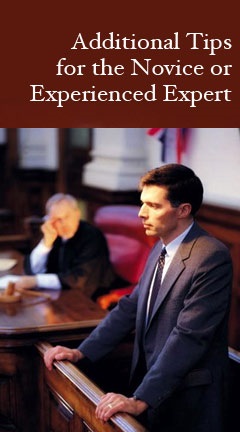Archival Notice
This is an archive page that is no longer being updated. It may contain outdated information and links may no longer function as originally intended.
Home | Glossary | Resources | Help | Course Map
- Don't be afraid to ask for clarification of unclear questions.
- Make sure the expert's testimony is consistent with experience and the technical literature.
- Explain in layman's terms how tests and measurements were performed.
- Make and maintain eye contact with the examining attorney. This helps to establish credibility.
- Be certain of the meaning of definitions used in questions and answers.
- Do not be too brief when giving answers to questions.
- Use examples for points of comparison.
- Limit the use of examples to one good one for each major point.
- Demonstrative materials require close attention of the trier of fact. Keep them simple.
- Confirm the use of demonstrative materials with counsel and the opposition.
- Step to one side of illustrations — face the audience.
- Draw first and then turn toward the audience.
- Be sure to make demonstrative drawings VERY LARGE.
- Do not try to read and talk at the same time.
- Do not look through the case file and talk at the same time.
- Meet with the attorney before the trial to discuss testimony.
- Translate statistics into a form that is meaningful for the case.
- Have a strong recollection of the facts in the case file.
- Generally stand firm on your testimony position.
- Admit errors at once.
- Be very familiar with your own résumé or curriculum vitae.
- Do not cut off questions or answer too quickly. Pause to take a breath.
- Know the relevant technical literature — particularly "the bible" in the expert's field of expertise — as well as the prominent journals.
- Ask the retaining attorney what items to take to court or deposition.
- Raise and lower the tone of voice and volume for effect.
- Use the "pregnant pause" as an effective response technique for conveying persuasive findings and opinion with confidence.
- Fix your eyes on the recipient of the information.
- Remember that court business is always very serious business.
- Know that it is permissible to laugh at obvious humor — but never be a joker.
- Refer to notes and notebooks during testimony as needed because they are helpful.
- Know that your notes and notebook can and will be looked at by the opposition.
- Let the examiner finish the question before starting to answer.
- Avoid putting your hands near your face — this signals nervousness and insecurity.
- Be sure that the preservation of chain of custody and evidence are perfect.
Additional Online Courses
- What Every First Responding Officer Should Know About DNA Evidence
- Collecting DNA Evidence at Property Crime Scenes
- DNA – A Prosecutor’s Practice Notebook
- Crime Scene and DNA Basics
- Laboratory Safety Programs
- DNA Amplification
- Population Genetics and Statistics
- Non-STR DNA Markers: SNPs, Y-STRs, LCN and mtDNA
- Firearms Examiner Training
- Forensic DNA Education for Law Enforcement Decisionmakers
- What Every Investigator and Evidence Technician Should Know About DNA Evidence
- Principles of Forensic DNA for Officers of the Court
- Law 101: Legal Guide for the Forensic Expert
- Laboratory Orientation and Testing of Body Fluids and Tissues
- DNA Extraction and Quantitation
- STR Data Analysis and Interpretation
- Communication Skills, Report Writing, and Courtroom Testimony
- Español for Law Enforcement
- Amplified DNA Product Separation for Forensic Analysts
Date Created: August 7, 2023


